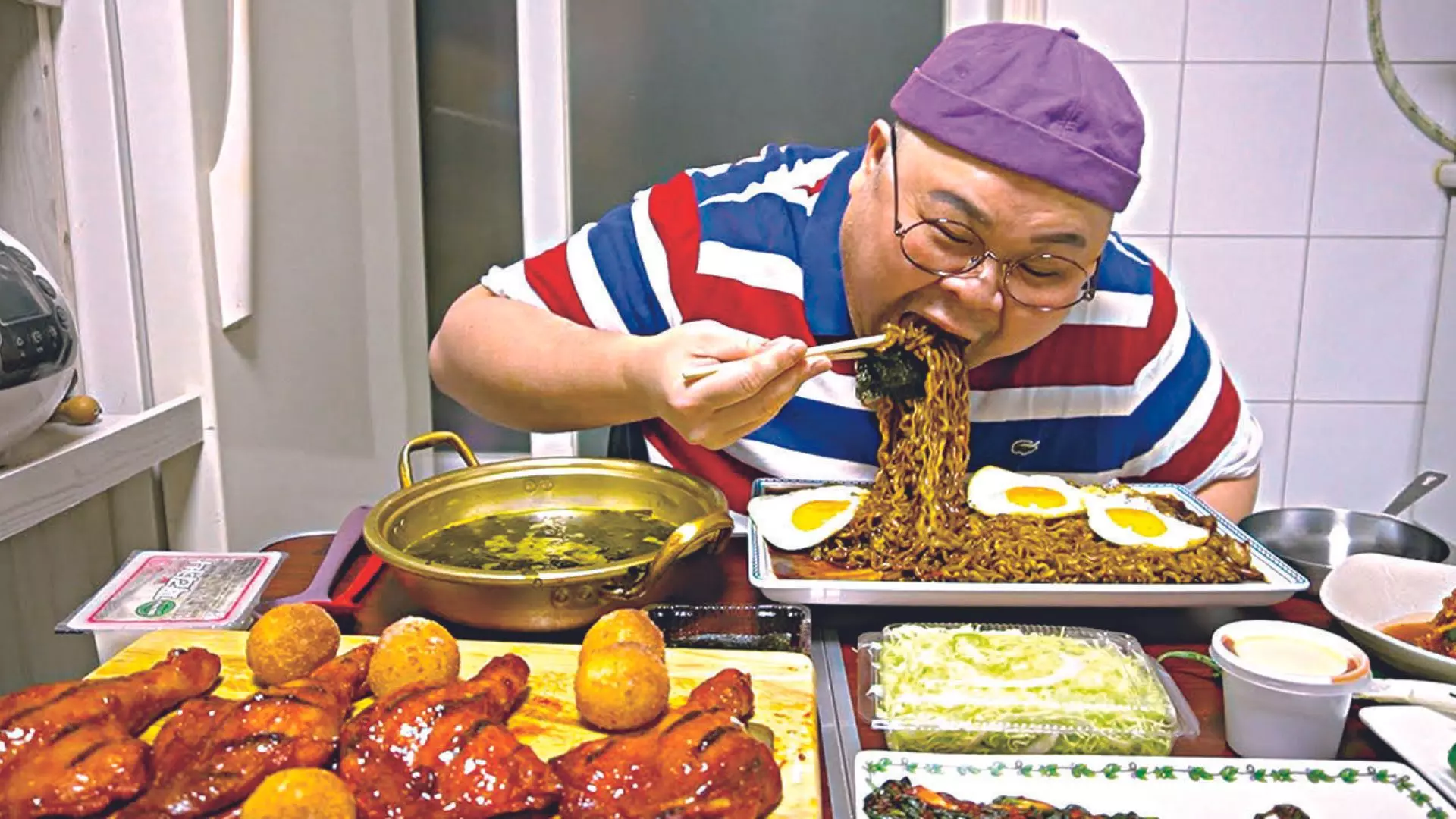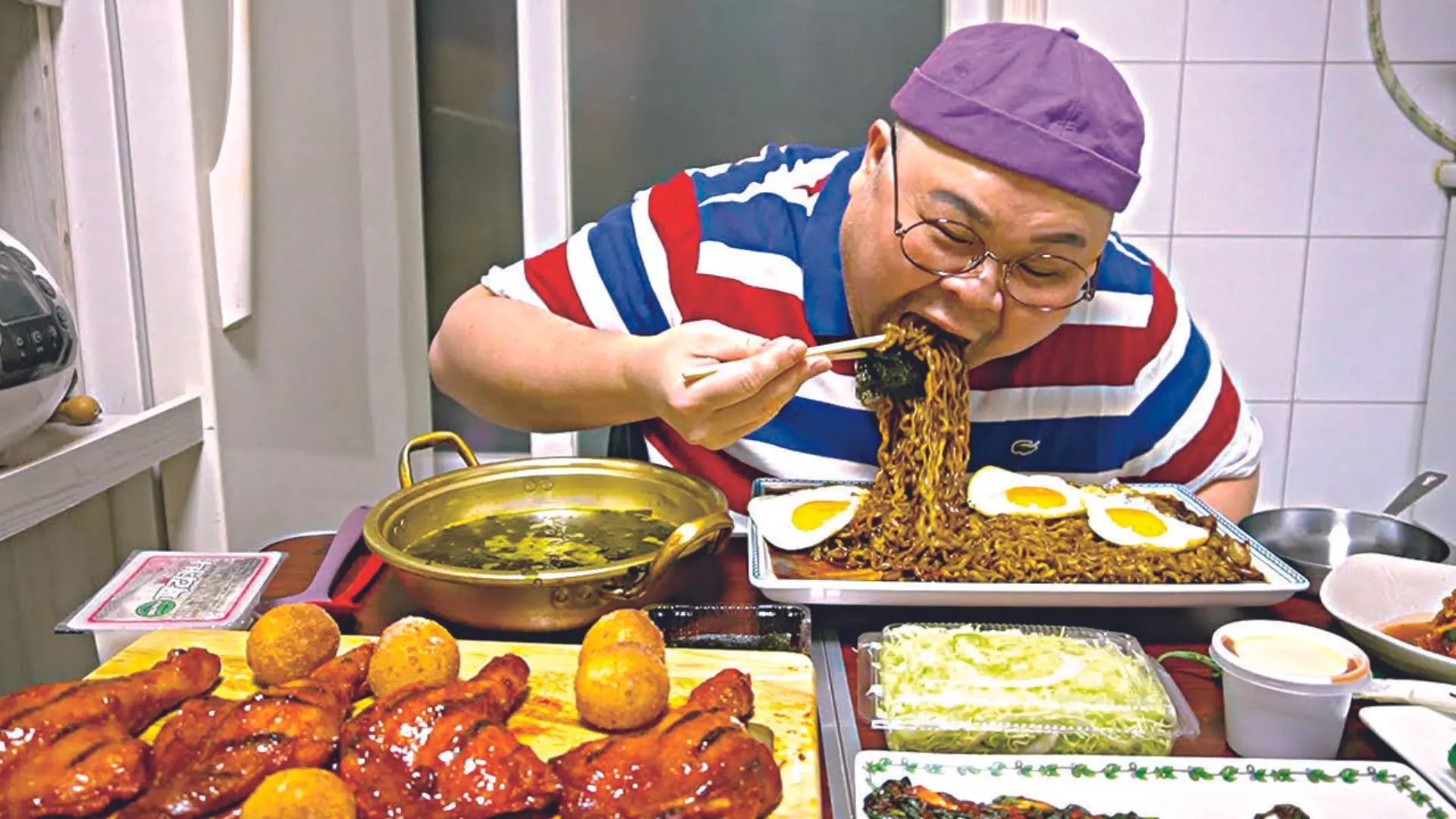
A rather unappetizing trend of food gluttons (aka mukbangers) gobbling down mountains of food is sweeping across social media. While netizens binge and cringe over these jaw-dropping food feats, the mukbangers tuck in nearly 5,000 to 15,000 calories in a single sitting. Some ravenous eaters even rake in a jumbo mazuma by polishing off a mound of pizzas, burgers, chicken legs, pani-puris, samosas, noodles, a heap of doughnuts, and buckets of ice creams. While these voracious eaters revel in millions matching their YouTube views, the practice of overeating can lead to severe health problems like obesity, diabetes, cancer, eating disorders, and anxiety.
The Origin of Binge Eating
Mukbang is a South Korean cultural phenomenon that began in 2010 and has since become a voracious trend on the internet. The word “mukbang” is a combination of the Korean words meokbang, which means ‘eating’, and bang-song, which means ‘broadcast’. Since its first inception in 2014 on a Korean TV Channel, famous mukbangers like Dona, Nicholas Perry, Keemi, Ashifa, Sourav Das, Jyoti Joshi and Deepika Verma have generated a firestorm on the internet for eating humongous quantities of food.
Most mukbangers often pair ASMR sounds of licks, chews and yums along with their videos. Indian mukbangers aren’t your typical ones slurping KFCs, Korean noodles, Pad Thai, and burgers. Our desi mukbangers can devour up to 50 panipuris, dosas, idlis, and traditional Indian cuisines like butter chicken, naan, rajma chawal, and palak paneer. Even vegetarians and vegans are not far behind, proving they can match their carnivorous counterparts. Take vegan mukbanger Disha Patgiri, for example, who devoured a heap of vegan chicken, rajma chawal and rice in mere minutes!
Big Eaters
The psychology of watching mukbang content is often associated with loneliness, and creeping eating disorders. According to research by the Jawaharlal Nehru Medical College, the motivations behind watching mukbang videos cannot be completely categorised into being positive or negative. It depends on its usage by the viewers. Watching mukbang offers digital commensality, entertainment, a para-social effect, escapism from real-life issues, and the opportunity for sexual use. Ashifa, a beauty, makeup and food ASMR content creator is the biggest mukbanger in India. The desi mukbanger can devour an elephant-sized chicken tandoori, biryani, curry and mutton josh. Speaking about her penchant for ASMR Ashifa says, “I attribute my channel’s growth to consistency, south Indian cuisine and open disclaimers. I eat humongous amounts of food in three sittings and not continuously which is often disclosed in the video disclaimer.” Ashifa says that heavy workouts coupled with following a diet the rest of the days as a model help her to maintain her weight. “Mukbang has helped me appreciate the value of food. Its taste and health benefits. Subscribers share their stories of how they regained their appetite through my videos. I spend a day shooting a single video,” says Ashifa.
Jyoti Joshi aka @FoodieJD, a mukbanger boasts over 800k subscribers on YouTube. She follows an OMAD diet to keep her from gaining weight. The One Meal a Day (OMAD) diet is an intermittent fasting method that instructs you to fast for 23 hours and then consume one large meal in one hour. The food calories in an OMAD diet are 1,200 calories, the perfect number of calories for a calorie deficit weight loss diet. “People have a penchant for satisfying their innermost cravings for delicious food through mukbang videos which have surged in popularity,” she says. Jyoti who uploads around three mukbang videos a week and plans her food according to her audience’s preferences in advance adds, “I connect with my audience through Instagram chat and comments and avoid street food and high calories when I am not creating mukbang content.”
Gluttony Gone Wrong
It’s no secret that eating humongous quantities of food can cause severe health issues. 83.5% of mukbang videos on YouTube have been found to contain overeating. Mukbang videos may also negatively impact people with a tendency to under-consume, such as those with anorexia Dr Shabana Parveen, a clinical nutritionist, Artemis Hospital, Gurugram says, “Overeating, especially of high-calorie, processed foods, can lead to weight gain, insulin resistance, and inflammation, contributing to diabetes and obesity. It increases the risk of developing certain cancers and cardiovascular problems like hypertension, atherosclerosis, and heart disease.”
Mukbang content is also a trigger for eating disorders and research has associated it with loneliness and avoidance of real-life viewers in its viewers. Pooja Shah Bhave, consultant clinical dietician, certified diabetes educator, Mumbai says, “Most short-term health problems include stomach feeling uncomfortably full, bloating, nausea, vomiting, heartburn, acidity, breathlessness and diarrhoea.” As to how Mukbang influencers can maintain their physical health and mitigate negative health benefits, “Influencers should regularly engage in physical activity for at least 1 hour a day consisting of 10,000 steps walking or 45 min active sports and 2-3 days of muscle strengthening. They can also showcase healthy meal options more balanced in vegetables, fruits and protein sources instead of pizza or a thali consisting of fried and junk food options.” adds Pooja.
Hard To Digest
• Dona, the most popular mukbang creator on YouTube has over 32 mn subscribers and 21 bn views
• Ashifa, a beauty, makeup & food ASMR Mukbang content creator has over 600K YouTube followers and 9 mn views
• Jyoti Joshi (aka @FoodieJD) a mukbanger has over 800K subscribers on Youtube
• Sourav Das (aka The Indian Mukbanger) has over 1 mn subscribers on Youtube and earns over ₹ 50,000 monthly from ads and brand deals
• Famous YouTubers like Trisha Paytas, Prajakta Kohli and Scherezade Shroff have tried their hands at mukbang content creation
